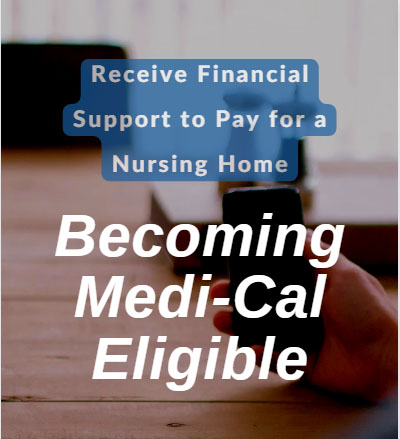Become eligible for financial help – to pay for an elder loved one needing long-term care in a Skilled Nursing Facility or at home, regardless of income

As our loved ones begin to age and have more and more healthcare needs, that’s the time we need to start thinking of financial support options available.
There is a lot of help available, regardless of income and assets, but the guidelines in California can be complex.
And the rules for California’s estate recovery program still apply – so your heirs will still be responsible for paying back the money used on your behalf if the planning was not done correctly.
If you’re wondering how to receive help and safeguard your assets, you’ve come to the right place.
What is Medi-Cal in California?
Medi-Cal is a government-funded health insurance program that provides coverage for individuals and families.
It’s known as Medicaid in other states – and it’s called Medi-Cal in California.
To receive Medi-Cal benefits for long-term care in a Skilled Nursing Facility (SNF), you don’t need to be low-income.
Even families with incomes of $20,000 per month can qualify with ethical and legal re-allocating of assets.
It is possible to protect some or all of your assets from the state’s Medi-Cal estate recovery while still meeting the eligibility requirements for Medi-Cal.
How can Medi-Cal Help Pay for Nursing Home Care in California?
If you or a loved one requires caregivers at home or long-term care in a nursing home, Medi-Cal can help cover the costs.
However, it’s important to note that Medi-Cal has strict asset limits. Without proper planning, you may need to “spend down” your assets in order to become eligible for benefits.
We can guide you on not having to spend down your assets by repositioning them, which will also prevent Estate Recovery.
In general, Medi-Cal considers your “countable assets” when determining eligibility.
Countable assets are those you own and can sell or use to pay for your care, such as bank accounts, stocks, and real estate (excluding your primary residence).

As of July 1, 2022, the asset limit for a single individual is $130,000. This means that you may not be eligible for Medi-Cal if you have more than $130,000 in countable assets.
However, certain assets, such as your primary residence (up to a certain value), burial plots, and personal possessions, are not counted towards this limit.
It’s important to note that if you are married, your spouse’s assets will also be considered when determining your Medi-Cal eligibility.
However, your spouse can keep some assets, known as the “community spouse resource allowance.” As of 2022, the community spouse resource allowance is $148,620 (and $130,000 for applicants).
If you have more assets than the limits allow, you may need to reposition the assets in order to get eligibility and avoid “spending down” your assets by paying for your care out of pocket until you reach the asset limit.
Once you have spent down your assets to the limit, you can apply for Medi-Cal to cover the costs of your nursing home care.
We know this can all sound confusing. But don’t worry. We can guide you on how to qualify without spending down, become eligible for Medi-Cal, and prevent Estate Recovery.
Here are some tips for protecting your assets when applying for Medi-Cal for eldercare in California:
- Transfer assets to a trusted family member or friend. One way to protect your assets is to transfer them to a trusted family member or friend not applying for Medi-Cal. This can include transferring ownership of a home, transferring stocks or other investments, or giving away money or other assets.
It is important to note that Medi-Cal has a “look-back” period of 30 months in California, meaning that any assets transferred within 30 months of applying for Medi-Cal may be subject to a penalty period during which you will not be eligible for benefits. We can minimize that period of ineligibility!
- One option is to use assets to pay for long-term care costs. If you have assets that are not protected, such as a home or savings account, you can use these assets to pay for long-term care costs before applying for Medi-Cal. This can be avoided with proper planning – helping you to preserve your assets and still meet the eligibility requirements for the program.
- Reposition your assets legally and ethically. Using proper guidance from a qualified Medi-Cal consultant, you can legally reposition your assets to ensure you are considered Medi-Cal eligible when you apply – and ensure Medi-Cal Estate Recovery can not attach your assets.
It is important to note that every situation is unique. It is recommended to consult with a financial planner Medi-Cal Consultant like Financial Security Designs to determine the best strategy for protecting your assets when applying for Medi-Cal for eldercare in California.

Here are some examples of how to protect your assets and become eligible for Medi-Cal:
- Consult with a Medi-Cal expert
The rules and requirements for Medi-Cal eligibility can be complex, and it’s important to understand how the program works and how it may impact your assets.
A Medi-Cal expert can help you navigate the process and develop a plan to protect your assets.
- Transfer assets to a spouse or loved one
One way to protect your assets is to transfer them to a spouse or loved one. However, it’s important to be aware of the “look-back” period, which is a period of time that Medi-Cal looks back at your financial transactions to see if you have transferred assets for less than fair market value.
Suppose you are found to have transferred assets during the look-back period. In that case, you may be penalized and made ineligible for Medi-Cal benefits for a certain period of time if the transfers were not done correctly.
The look-back period in California is 30 months, so it’s important to consult with a Medi-Cal expert to ensure that any asset transfers are done properly and within the rules.
There are several Medi-Cal planning tools that can help you protect your assets and become eligible for benefits.
It’s important to note that these tools can be complex, and it’s important to consult with a Medi-Cal expert to ensure they are used properly.
What You Need to Know About PACE
If the elder loved one is still receiving care at home, I am letting my clients know about the PACE program. It’s a Medicare and Medicaid program that helps people meet their healthcare needs in the community instead of going to a nursing home or other care facility.
They must be eligible for Medi-Cal before they can qualify, so it works well within the services we provide for our clients.
As their consultant on Medi-Cal, we would give PACE a call and provide the Medi-Cal documentation and contact info for the client.

PACE – Program of All-Inclusive Care for the Elderly
PACE is a great benefit for those seniors that do not require full-time care in a nursing home and are capable of living at home independently.
With PACE, you have a team of healthcare professionals working with you and your family to ensure you get the coordinated care you need.
When you enroll in PACE, you will be required to use a PACE-preferred doctor.
How Does PACE Work?
PACE covers all Medicare- and Medicaid-covered care, services, and other services that the PACE team of healthcare professionals decides are necessary to improve and maintain your health.
This includes drugs and other medically necessary care, like doctor or health care provider visits, transportation, home care, hospital visits, and even nursing home stays when necessary.
If you have Medicaid, you won’t have to pay a monthly premium for the long‑term care portion of the PACE benefit. If you have Medicare but not Medicaid, you’ll be charged a monthly premium to cover the long‑term care portion of the PACE benefit and a premium for Medicare drug coverage (Part D).
However, there’s never a deductible or copayment for any drug, service, or care approved by the PACE team of healthcare professionals.
Who Can Get PACE?
You can have either Medicare, Medicaid, or both to join PACE. PACE is only available in some states that offer PACE under Medicaid. To qualify for PACE, you must:
- Be 55 or older
- Live in the service area of a PACE organization
- Need a nursing home-level of care (as certified by your state)
- Be able to live safely in the community with help from PACE
What Does PACE Cover?
PACE provides all the care and services covered by Medicare and Medicaid if authorized by your healthcare team. If your healthcare team decides you need care and services that Medicare and Medicaid don’t cover, PACE may still cover them.
Here are some of the services PACE covers:
- Adult day primary care (including doctor and recreational therapy nursing services)
- Dentistry
- Emergency services
- Home care
- Hospital care
- Laboratory/x-ray services
- Meals
- Medical specialty services
- Nursing home care
- Nutritional counseling
- Occupational Therapy
- Physical therapy
- Prescription drugs
| Note |
| If you join a PACE program, you’ll get your Part D-covered drugs and all other necessary medication from the PACE program. You don’t need to join a separate Medicare Prescription Drug Plan. If you do, you’ll be disenrolled from your PACE health and prescription drug benefits. |
- Preventive care
- Social services, including caregiver training, support groups, and respite care
- Social work counseling
- Transportation to the PACE center for activities or medical appointments, if medically necessary. You may also be able to get transportation to some medical appointments in the community.
How to Apply for PACE
To find out if you’re eligible and if there’s a PACE program near you, search for PACE plans in your area or call your Medicaid office.
What You Pay for PACE Depends on Your Financial Situation
If you don’t have Medicare or Medicaid, you can pay for PACE privately.
Important to Remember
Paying for long-term care in a nursing home can be a daunting and expensive prospect, but Medi-Cal can be a helpful resource for those who want financial assistance and resources for their elder loved ones.
It’s important to understand the rules and requirements for Medi-Cal eligibility and how to protect your assets while still becoming eligible for benefits.
You can protect your assets and become eligible for Medi-Cal in California, regardless of income and assets. Still, it requires proper planning to make sure it’s all done legally, ethically, and within the California-provided guidelines. With the right guidance, you protect your family from Estate Recovery.
Contact us today for a quick chat and get your questions answered. You’ll be surprised at all you learn!
